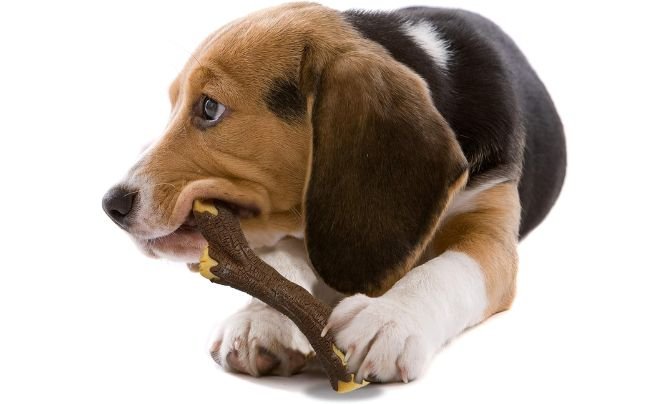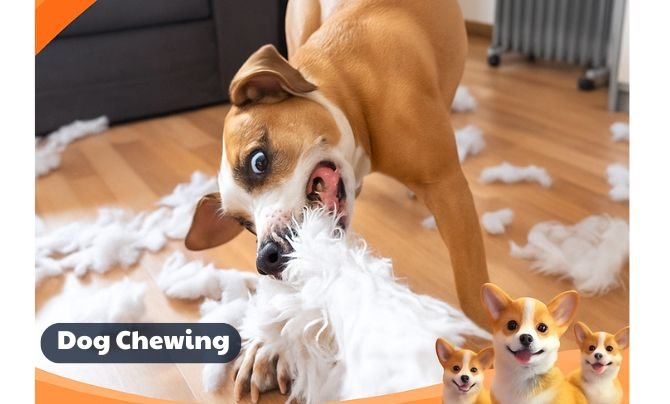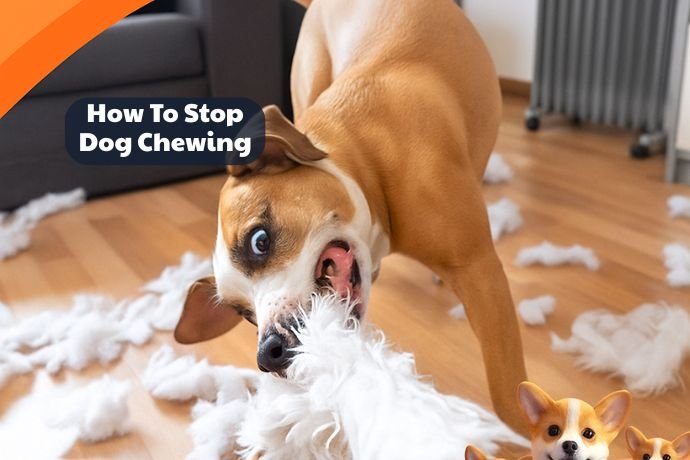If you are struggling with the problem of how to stop dog chewing, this article should help you get to the root of the problem. Trying to deal with dogs that insist on chewing everything they come in contact with can be incredibly frustrating, and causes of much anxiety to dog owners. However, there are things dog owners can do to stop dog chewing. By understanding why your dog channels all his energy into chewing things, you can minimize the problem and try to identify the root cause of the problem.
In the following article, I explore the reasons why dogs exhibit inappropriate chewing, and suggest solutions to stop dog chewing.
Stop Dog Chewing – How to Handle Teething Puppies

Teething is a completely natural—and often frustrating—stage in a puppy’s life. Between the ages of 3.5 to 11 months, puppies begin to chew more aggressively as their new teeth grow in. While it’s impossible to stop dog chewing completely during this phase, there are many ways to manage it and protect your belongings in the process.
Why Do Puppies Chew While Teething?
Puppies chew for one main reason: to relieve teething discomfort. As their teeth push through the gums, chewing helps ease pain and soothes irritation. This isn’t bad behavior—it’s instinctive and essential for healthy development.
(a) Top 10 Best Puppy Teething Sticks Reviews
Best Chew Toys to Stop Dog Chewing
Offering a mix of hard and soft chew toys is the best way to redirect your puppy’s chewing instinct:
Effective Hard Chew Toys:
- Rubber bones
- Nylon chew toys
- Natural bones (sized appropriately)
Gentle Soft Chew Toys:
Rotate the toys to keep them interesting and clean them regularly to maintain hygiene.
Use Bitter Apple Spray to Discourage Chewing
One proven solution to stop dog chewing on furniture, shoes, and household items is bitter apple spray. This dog-safe, non-toxic product tastes terrible to most dogs and is effective when applied to:
- Furniture legs
- Shoes and slippers
- Electrical cords
- Baseboards
Keep a bottle handy during the teething months—it also works well for adult dogs with persistent chewing habits.
Safe Household Alternatives for Teething Relief
Some everyday items can be offered to help soothe your puppy’s gums—just ensure they’re safe and not choking hazards:
- Ice cubes – help reduce inflammation
- Cold apple slices – soothing and tasty
- Carrots – crunchy and good for teeth
- Dog biscuits – satisfy chewing urges and promote dental health
Avoid anything that can splinter, break apart, or be swallowed in large chunks.
Read full: Top 10 Best Small Dog House Reviews
Puppy-Proofing Your Home to Prevent Destruction
To stop dog chewing from damaging your home:
- Keep floors and surfaces clean of socks, shoes, and cords
- Use closed bins for laundry
- Keep towels and soft fabrics out of reach
- Limit access to unsupervised areas
Puppy-proofing is as important as baby-proofing. If it’s not available, it can’t be chewed!
Prevent Chewing Out of Loneliness or Boredom
Chewing isn’t always about teething. A bored or lonely puppy may chew to pass time or reduce anxiety. Make sure your pup gets:
- Plenty of playtime
- Mental stimulation (like puzzle toys)
- Walks and bonding sessions
If you can’t supervise them 24/7, consider a safe playpen or crate filled with appropriate toys.
Final Tips to Stop Dog Chewing
- Be consistent with redirection: gently guide your puppy from chewing forbidden items to their toys.
- Praise and reward good chewing behavior.
- Never punish chewing—it’s a natural urge.
- Be patient—teething doesn’t last forever, and your puppy will grow out of it with the right guidance.
Read more: Top 6 Electric Dog Grooming Table Reviews
How to Stop Dog Chewing in Adult Dogs

If your adult dog is chewing up furniture, shoes, or anything within reach, it’s a sign of boredom, anxiety, or loneliness—not mischief or revenge. While it can be frustrating, understanding the underlying cause is key to stopping destructive behavior and preserving your belongings.
Why Do Adult Dogs Chew?
Once puppies outgrow the teething phase, chewing typically becomes a response to emotional needs:
- Boredom from lack of mental stimulation
- Separation anxiety when left alone too often
- Attention-seeking behavior when understimulated
Understanding this helps you correct the behavior without punishment and focus on healthy outlets for your dog’s energy.
Short-Term Strategy: Use a Crate or Safe Space
If you can’t supervise your dog constantly, a crate or designated confinement area can help stop dog chewing in the short term. Crating:
- Prevents access to off-limit items like electrical cords or shoes
- Keeps your dog safe from chewing dangerous objects
- Gives you peace of mind when you’re away
🚫 Important: Never use the crate as punishment. It should feel like a safe, calming place for your dog.
Redirect Chewing with the Right Dog Toys
Rather than scolding your dog for chewing inappropriate items, offer engaging alternatives. High-quality chew toys satisfy the instinct while keeping their mouth and mind busy.
Great Chew Toy Options:
- Rubber toys (e.g. KONG)
- Natural bones or antlers
- Tough fabric rope toys
- Puzzle toys for mental stimulation
Keep a variety of toys on hand and rotate them weekly to maintain interest.
(b) Best Dog Training Toys Reviews
Address the Root Causes of Destructive Chewing
1. Combat Loneliness & Anxiety
Dogs are social creatures and need connection. If they’re chewing out of stress:
- Increase bonding time through walks or play
- Leave calming music on when you’re away
- Hire a dog walker or arrange a playdate with another dog
2. Eliminate Boredom
Daily stimulation prevents dogs from turning to chewing as entertainment.
- Provide 30–60 minutes of exercise daily
- Introduce interactive toys or treat-dispensing puzzles
- Teach new tricks or commands to challenge their mind
Don’t Punish—Redirect and Reward
It’s easy to get upset when your dog destroys a favorite item. But yelling or punishing won’t teach them what to chew—it only creates fear. Instead:
- Calmly remove the chewed item
- Replace it with an appropriate chew toy
- Reward your dog with praise or treats when they chew correctly.
When to Seek Professional Help
If your efforts don’t stop dog chewing or the behavior escalates, it may be time to:
- Consult your veterinarian (to rule out health issues)
- Work with a certified dog trainer or behaviorist
- Explore calming aids like natural supplements or anxiety wraps
See more: How to Calm a High Energy Dog
Stop Dog Chewing by Meeting Your Dog’s Needs
Confinement can be a helpful short-term fix, but to truly stop dog chewing in adult dogs, you need to meet their physical, emotional, and mental needs.
✅ Quick Checklist:
- Do they have a variety of chew toys?
- Are they getting enough daily exercise?
- Are they left alone for long hours without stimulation?
- Do they receive consistent training and affection?
By addressing these core areas, you’ll not only stop dog chewing—you’ll strengthen your bond and raise a happier, more balanced companion.






